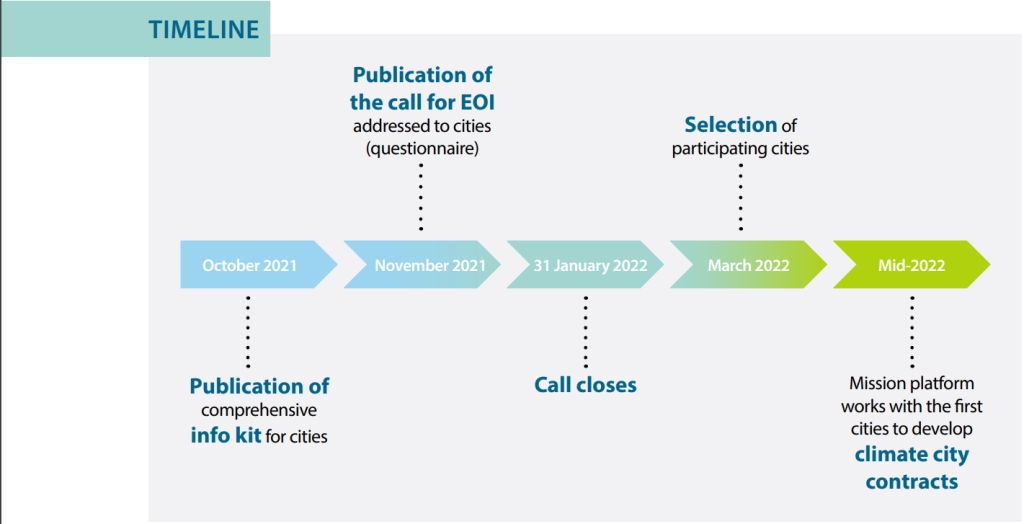The most pressing challenges that we face nowadays need coordinated, transnational efforts to be identified, tackled, and solved. Hence, the engagement of stakeholders at all levels – researchers, entrepreneurs, citizens, and policy makers – is crucial to achieve the synergy effect necessary to invent and implement the tailored-made solutions.
The European Commission has identified five societal challenges that need to be addressed – adapting to climate change, fighting cancer, living in greener cities, protecting the ocean, seas, and waters, and ensuring healthy soil and food – and has prepared a cross sectoral actions (within the framework of Horizon Europe) to overcome them – EU Missions.

The five EU Mission are:
- Adaptation to Climate Change: support at least 150 European regions and communities to become climate resilient by 2030
- Cancer: working with Europe’s Beating Cancer Plan to improve the lives of more than 3 million people by 2030 through prevention, cure and solutions to live longer and better
- Restore our Ocean and Waters by 2030
- 100 Climate-Neutral and Smart Cities by 2030
- A Soil Deal for Europe: 100 living labs and lighthouses to lead the transition towards healthy soils by 2030
The EU Missions has been launched by the EC on late September 2021 (Communication from the Commission on European Missions) and for each of the missions an implementation plan has been published.
The Missions Work Programme 2021-2022 has been amended on 15th December 2021 (including 19 new calls for funding with an overall budget available at approx. 550 mln euro in 2021 and 125 mln EURO in 2022) and then on May 2022. The EU Mission Calls are published at funding&tender opportunities portal:
- Adaptation to climate change – 6 calls with deadline till 27 September 2022
- Restore our Ocean and Seas – 10 callswith deadline till 27 September 2022
- Soil deal for Europe – 10 calls with deadline till 27 September 2022
- Cancer – 5 calls with deadline till 7 September 2022
- Climate neutral and smart cities – 1 call with deadline till 6 September 2022
The EU Missions intervention aims at attracting all stakeholders, not only for R&I organizations or entrepreneurs. Hence, when submitting projects proposals, it is crucial to address the EU Mission objectives and support public policy intervention.
In the HE Work Programme 2021-2022, Missisons, the objectives, timeline and dedicated financing mechanisms for each of the EU Missions are described.
Budgets for MISSIONS’ CALLS WITH DDL IN 2022 are at the level of:
Adaptation to Climate Change: € 110 mln, 5 topics
Cancer: € 125.6 mln, 3 topics
Ocean, Seas and Waters: € 104 mln, 12 topics
Climate-Neutral and Smart Cities: € 159 mln, 6 topics
Soil Health and Food: € 62 mln, 8 topics

Latest news on EU Missions are available on EC website here.
Missions will help deliver key EU policy priorities such as the European Green Deal, Europe’s Beating Cancer Plan, NextGenerationEU, the EU Industrial Strategy and A Europe fit for the Digital Age, amongst others.
Adaptation to Climat Change
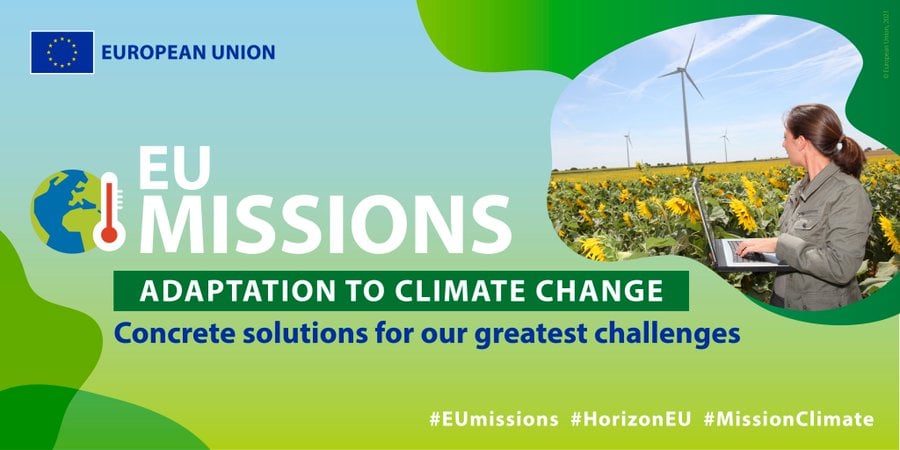
The overall goal of the Mission ‘Adaptation to Climate Change’ is to enable Europe to prepare for unavoidable climate impacts (e.g. extreme events) and accelerate the transformation to a climate-resilient Europe.
Implementation Plan on Adaptation to Climate Change Mission is available here.
Open and upcoming Mission Calls are published at the Funding & Tender opportunities portal.
Specific OBJECTIVES of the Mission Adaptation to Climate Change:
Preparing and Planning for climate resilience
Accelerating transformations to climate resilience
Demonstrating systemic transformations to climate resilience
ACTIONS foreseen by the Mission:
- step 1 – better understanding of climate change related risks – development a climate risk and vulnerability assessment framework and a knowledge hub which will allow citizens to access information and understand how the places in which they live are or will be affected by climate change;
- step 2 – the mobilisation of support and engagement – at least 150 regions and communities have well-established governance structures steering the transformation to climate resilience;
- step 3 – the formulation of a vision and pathways – at least 150 regions and communities have formulated their specific vision of a climate resilient future and the transformative pathways to reach it;
- step 4 – the orchestration of transformative solutions – at least 150 regions and communities have been involved in development and testing of a whole range of transformative solutions that have been developed, tested and/or brought close to the market;
- step 5 – creating impact at scale – at least 75 demonstrations of systemic transformations contributing to the overall climate resilience of regions.
Additional materials:
Latest information on the Mission ‘ Adaptation to Climate Change’ at the EC website.
Mission Factsheet is available here.
The PolSCA Office will soon invite you to take part in the webinar on Adaptation to Climate Change Mission that is being organized with the NCBR Office in Brussels – Business & Science Poland and will take place on January 20, 2022.
Cancer
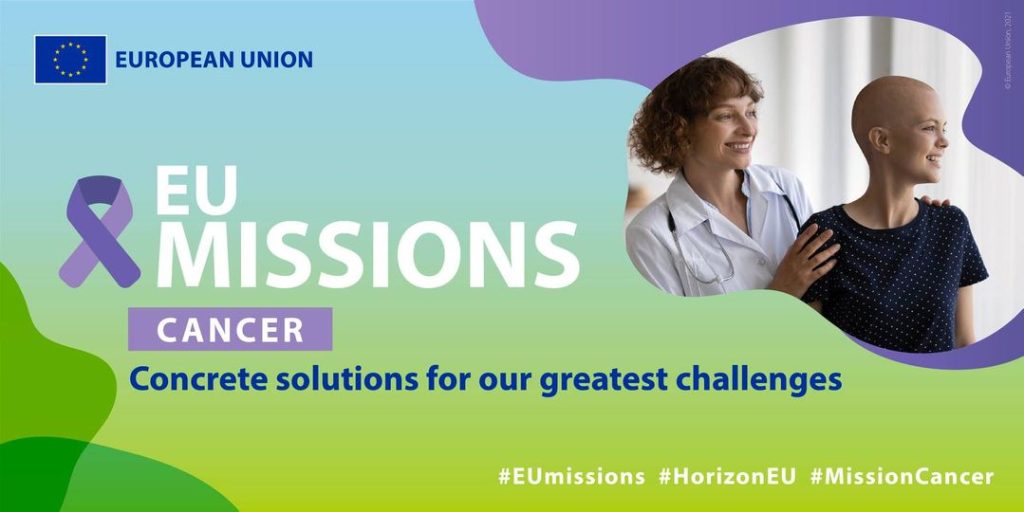
The overall goal of the Mission Cancer (combining forces with the Europe’s Beating Cancer Plan) is to improve the lives of more than 3 million people by 2030, through prevention, cure and for those affected by cancer including their families, to live longer and better, by accelerating cancer prevention and control programmes and creating more equitable access to these programmes
Mission Cancer Implementation Plan is available here.
Open and upcoming Mission Cancer Calls are published at funding&tender opportunities portal.
Specific OBJECTIVES of the Mission Cancer:
Understanding
Prevention, including screening and early detection
Diagnosis and treatment
Quality of life
The actions foreseen under the four objectives will address the whole cancer control continuum, from prevention, early diagnosis, and treatment, to survivor support, palliative and end-of-life care, for all ages and all cancers, including rare and poorly understood cancers.
In addition to the above mentioned, the Mission Cancer has established 4 operational objectives (transversal):
- Ensure equity and access to knowledge, research and care
- Promote innovation, test, validate, demonstrate and upscale solutions
- Address childhood cancer and personalised medicine
- Engage with the cancer community, citizens/patients and society at large
ACTIONS foreseen by the Mission Cancer
UNDERSTAND
- Establish the ‘UNCAN.eu’ platform
- Better understand healthy versus cancer cells at individual and population level
- Better understand cancer-patient molecular, cell, organ, organismal interactions
- Determine the role of genetics in cancer
PREVENT
- Develop a one-stop cancer information centre on prevention
- Boost research and innovation into risk assessment
- Conduct implementation research on cancer prevention
- Establish synergies on prevention with other missions
- Optimise and improve access to existing screening programmes
- Develop new methods and technologies for screening and early detection
- Develop early predictors/tests
DIAGNOSTICS AND TREATMENT
- Support the creation of a Network of Comprehensive Cancer Infrastructures, integrating research aspects
- Develop twinning programmes for capacity-building
- Develop a clinical trial programme on diagnostics
- Develop a clinical trial programme on treatments
QUALITY OF LIFE
- Collect and analyse data on today’s unmet needs of cancer patients and survivors
- Develop early predictors for quality of life
- Design monitoring programmes for survivors of childhood cancer
- Set up of a European Cancer Patient Digital Centre
Additional materials:
Overall logic of the Mission Cancer presentation
Latest information on the Mission Cancer at the EC website
Will it be possible to save 3 million people from cancer? – The Cancer Mission in Horizon Europe and the European Plan against Cancer – PolSCA Office webinar November 17th, 2021
Restore our Ocean and Waters
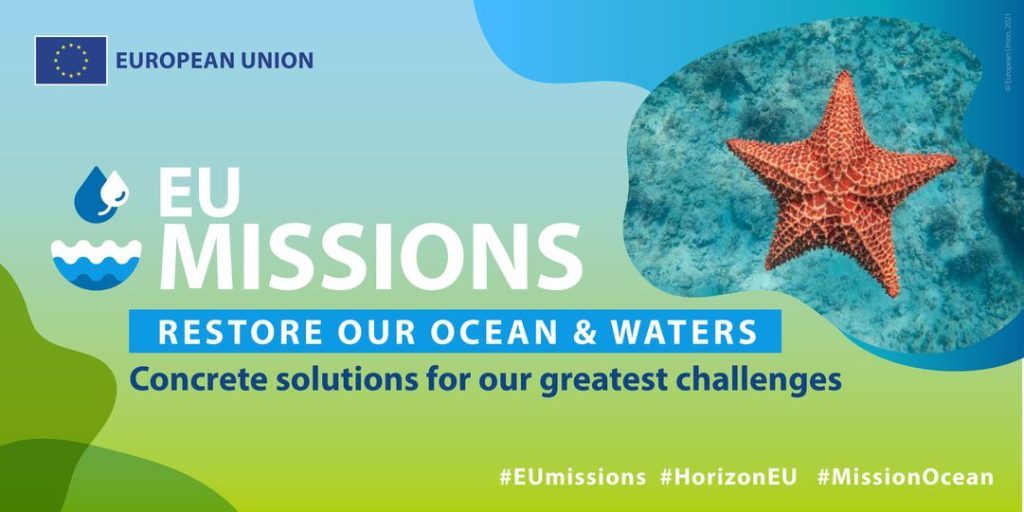
The overall goal of the Mission ‘Restore our ocean and waters by 2030’ is to ensure systemic path to restoration of the health of the ocean & waters by 2030.
Implementation Plan on Mission Restore our Ocean and Waters is available here.
Open and upcoming Mission Calls are published at the Funding & Tender opportunities portal.
Specific OBJECTIVES of the Mission Restore our Ocean and Waters:
Protect and restore marine and freshwater ecosystems and biodiversity in line with EU Biodiversity Strategy
Prevent and eliminate pollution in line with EU Zero Pollution Action Plan
Make the sustainable Blue economy climate neutral and circular in line with EU Climate law
ACTIONS foreseen by the Mission:
DEVELOPEMENT AND PILOTING PHASE (2021-2024):
- Mission lighthouses
- Blue Parks Platform
- Piloting of innovative R&I solutions
- Precursor of digital ocean and water knowledge system
- Citizen science, literacy and engagement
DEPLOYMENT AND UPSCALING PHASE (2025-2030)
- Scale up projects
- Blue parks conservation projects
- Dynamic investment ecosystem
- Digital Ocean and water knowledge system
- Digital Twin Ocean
- Citizen science, literacy and engagement
LIGHTHOUSES:
- Danube river basin – Restoration lighthouse – to protect and restore marine and freshwater ecosystems and biodiversity
- Atlantic & Arctic basin – Restoration lighthouse to protect and restore marine and freshwater ecosystems and biodiversity
- Mediterranean sea basin – Pollution lighthouse – to prevent and eliminate pollution
- North and Baltic sea basin lighthouse – to make the blue economy carbon- neutral and circular
Additional materials:
Latest information on the Mission ‘Restore our Ocean and Waters’ at the EC website.
‘The Mission Starfish 2030: Let’s restore our water resources and oceans’ – Webinar PolSCA and BSP/NCBR (May 10, 2021)
Mission Factsheet is available here.
Climate-Neutral and Smart Cities
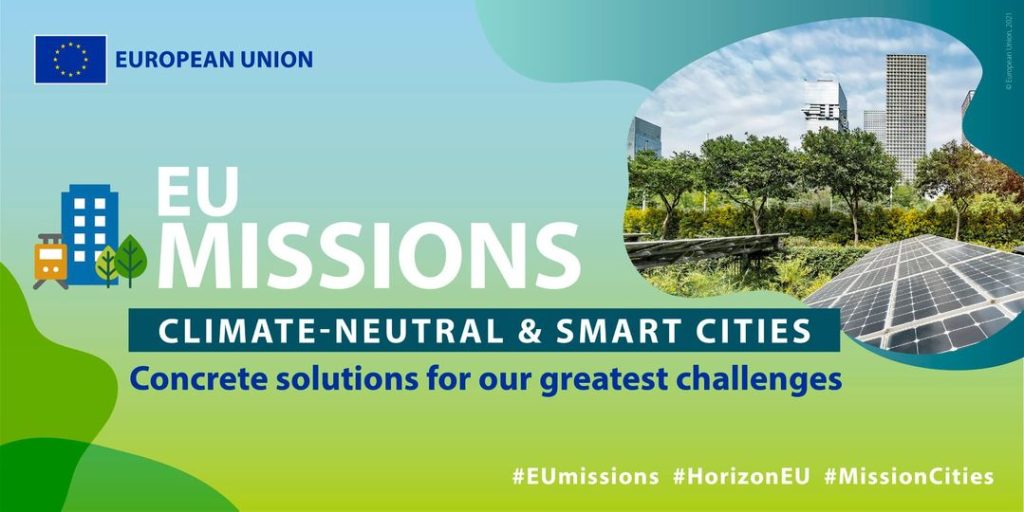
Cities take up only 4% of the EU’s land area, but are home to 75% of EU citizens. Worldwide, cities account for more than 65% of energy consumption and for more than 70% of CO2 emissions.
Therefore cities have the potential to help enabling the EU to reduce climate emissions by 55% by 2030 and to become climate-neutral by 2050, goals established by the European Green Deal.
The Mission Climate Neutral and Smart Cities has two general OBJECTIVES:
Delivering 100 climate-neutral and smart cities by 2030
Ensuring that these cities act as experimentation and innovation hubs to enable all European cities to follow suit by 2050
Mission Climate Neutral and Smart Cities Implementation Plan is available here.
Open and upcoming Climate Neutral and Smart Cities Calls are published at funding&tender opportunities portal.
ACTIVITIES
- Demand-driven Climate City Contracts
- Mission Platform
- Tailor-made investment plans for cities
- Mission label to unlock synergies with other programmes
- Large scale EU R&I demonstrators accelerating city climate-neutrality solutions
- Accelerating and spreading knowledge and capacity (cities as innovation hubs)
- Innovative city governance models and citizens’ engagement
- A common framework for monitoring, reporting and verification (MRV)
- Network of national authorities for increased preparedness
- A supportive regulatory framework
ENGAGING CITIES:
Because the involvement of local authorities, citizens, businesses, investors as well as regional and national authorities is crucial, on 25 November 2021 the EC launched a Call for Expression of Interest addressed to cities interested in stating their interest in becoming climate-neutral by 2030.
The Info Kit for Cities is available here an obligatory registration is open here.
In addition, a dedicated platform NetZeroCities has been established.
Additional materials:
Latest information on the Mission Climate Neutral and Smart Cities at the EC website
EC initiative to Shaping more beautiful, sustainable, and inclusive forms of living together –The New European Bauhaus.
A Soil Deal for Europe
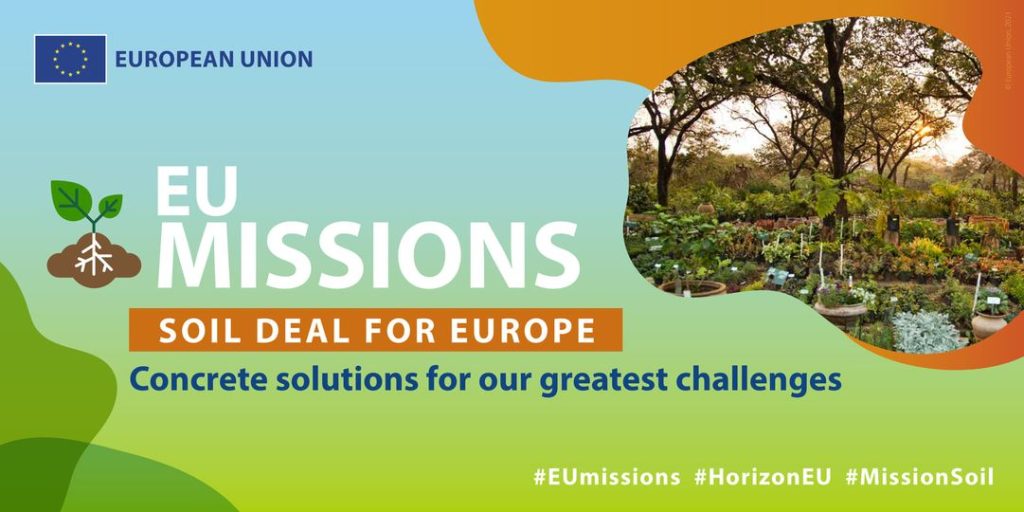
The overall goal of the Mission A Soil Deal for Europe is to create 100 living labs and lighthouses to lead the transition towards healthy soils by 2030. Soil health has been defined as “the continued capacity of soils to support ecosystem services”
Mission Implementation Plan is available here.
Open and upcoming Mission Calls are published at the Funding & Tender opportunities portal.
Specific OBJECTIVES of the Mission Soil Health and Food:
Reduce desertification
Conserve soil organic carbon stocks
Stop soil sealing and increase re-use of urban soils
Reduce soil pollution and enhance restoration
Prevent erosion
Improve soil structure to enhance soil biodiversity
Reduce the EU global footprint on soils
Reduce the EU global footprint on soils
Each specific objective is backed by one or more quantified targets and measurable indicators. Objectives apply to all types of land use.
ACTIONS foreseen by the Mission:
- R&I programme – data infrastructures and platforms; knowledge to support management practices, business models, technologies
- Living labs and lighthouses – a network of real-life sites for testing, demonstrating and upscaling of interdisciplinary and intersectoral solutions;
- Soil monitoring – harmonisation of indicators, measuring and reporting for soil health across Europe; contribution to European Soil Observatory
- Soil literacy, communication citizen engagement – Communication material, training curricula for different target groups and specialised “soil advisors”
Additional materials:
Latest information on the Mission Soil Deal for Europe at the EC website.
European Mission “Caring for soils is caring for life” – Webinar PolSCA and BSP/NCBR (September 23, 2021) has prepared a cross sectoral actions (within the framework of Horizon Europe) to overcome them – EU Missions.
Mission Factsheet is available here.
Contact: Magdalena Dobrzyńska, magdalena.dobrzynska@polsca.pan.pl
Joanna Komperda, joanna.komperda@polsca.pan.pl
